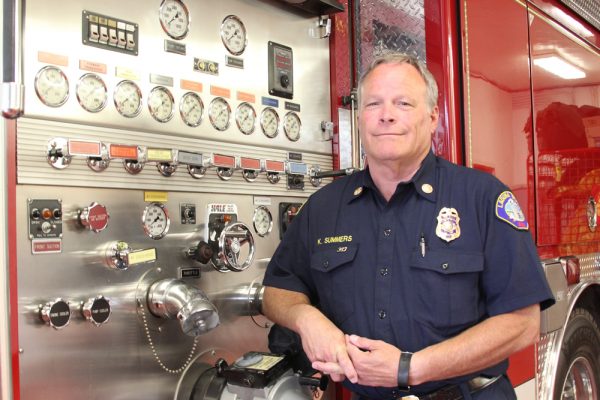After working 30 years in fire fighting for larger, resource-deep agencies in three counties, Kirk Summers found serving as interim fire chief of Laguna Beach’s four-station department both refreshing and challenging.
Without the depth of infrastructure of larger departments to assign staff to specialize in different tasks, the captains who supervise local engine crews pull double-duty with extra responsibilities, such as training, gear testing and inspections.

In some instances, the lack of bureaucracy means a change in practices can be put in place swiftly. The downside of such thin staffing means personnel lack the opportunity for promotion and specialization.
A cautionary briefing on the operational differences between small and large fire departments is part of Summers’ transition plan, which he described in an interview this week. Due to restrictions on outside work among those receiving public pensions, Summers turned over the chief’s job this past Thursday to another interim commander, Battalion Chief Tom Christopher, until the permanent one pins on the badge.
Who that is remains an internal matter for the moment. City Manager John Pietig said the hiring process is still being completed and a public announcement about a newly hired chief is a few weeks away.
Summers’ six-month term as interim chief followed the retirement of former Chief Jeff LaTendresse, a 20-year veteran of the department who had served in every capacity. As chief, he pushed to expand paramedic service to every engine and reorganize schedules for battalion chiefs to mirror the engine companies they supervise.
The chief, with a salary of $196,600, leads a 41-person department with a budget of $11 million. Its four stations annually respond to 3,800 requests for service, a majority of them medical emergencies. About 15 percent of the calls involve car and cliff rescues and another 15 percent involve fires, a city budget summary said.
As interim chief, Summers participated in helping identify a successor, culled from a pool of 36 applicants, seven of whom were interviewed.
His management style includes providing his successor and the city manager a to-do list of fire-safety recommendations that have potential to lower the town’s risk for calamity. “It’s a high-risk place,” said Summers, citing hilly topography that lengthens response times, residential areas bordered by brush-covered open space and narrow car-clogged streets that large engines navigate gingerly.
Having worked as a reserve firefighter in Ventura County, Summers said December’s 280,000-acre Thomas fire, the largest in California’s recorded history, struck a nerve. He identified some parallels to Laguna in recent discussions with the city’s Emergency Disaster Preparedness Committee. “We have every bit as much of a challenge as they do,” Summers said. “Can we make it bullet proof? No, but we can reduce the risk.”
The state fire authority describes the Thomas fire as unprecedented, not for its size, but because of its occurrence in December, testimony to dry conditions that yield catastrophic wildfires. Due to a return of drought conditions this season, Calfire designated Southern California, from Point Conception to Mexico’s border, as above normal for fire potential in its February report.
Summers’ supports the city initiative to rid the town of overhead utility wiring, the ignition source for several fires in town in recent years, though not the factor behind the 1993 firestorm that destroyed 440 homes. He advocates a more aggressive on-the-ground approach: a comprehensive citywide strategy for wild land fuel management, rather than the current piecemeal approach. He hired a consultant to develop a road map to tackle brush within the city’s nine square miles, which he’ll leave to his successor to pursue.
Such a plan needs to go beyond weed-chomping goats, which Summers concedes are effective but indiscriminate in devouring protected species. And hand-clearing presents its own regulatory hurdles.
Summers thinks more emphasis should be placed on making the town safe from the inside, coaxing private property owners to harden their homes against wild land fires with various improvements and smarter ornamental landscaping choices.
He is no fan of eucalyptus after a humiliating experience as a young fire captain in 1984. Summers recalled being dispatched to a quarter-acre grass fire in El Toro, where old eucalyptus windrows divided citrus groves. Thinking his engine and another could douse the blaze, Summers turned down the offer of extra fire fighting resources before a gust of wind pushed the fire into leaf litter, which ignited and broadcast flame as if flung by 1,000 matches. He got back on the radio to request the help he had just turned away to put out what became a 250-acre blaze.
“I was pretty humble the rest of the day,” he said.
Summers said he is likely to resume teaching professional development for academies in other fire departments and working for Disneyland’s private fire department. Given a career that involved stints at multiple fire fighting agencies, Summers says he makes an effort to stay in touch with former colleagues, such as those he’s worked with in Chino and San Gabriel. He figures he’s entitled to a Laguna membership now, too, and is likely to show up for events where fire fighters participate, such as flipping flapjacks off-duty at the annual Memorial Day breakfast in Heisler Park.
“I don’t just leave and walk out,” he said.





[…] intends to see through a fuel-modification initiative started by his predecessor, interim Chief Kirk Summers. Rather than a piece meal approach to brush clearance in the town’s internal canyons, the […]